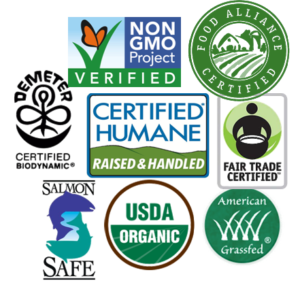
Photo Courtesy of: Dostler, Gina.
Sustainable Certifications As They Relate To You
As we transition back to agrarian values research indicates the importance of sustainable certifications and an increase in goods sold. You may find yourself contemplating the value of additional certification if you haven’t already achieved it. Transparently defining the value of your goods insures that customers can trust you. This also means that they’ll return and encourage more word of mouth sales. Some certifications worth considering may include fair trade and organic certification. Ideally your label and brand should reflect values that will allow you to build lasting relationships with your consumers. You should assess how labels can improve your triple bottom line. How they add sustainable value to your farm economically, environmentally, and socially will help you withstand the test of time. It will also allow you to have a better quality of life and build a more values based community.
What Sustainable Certifications Matter Most To You
What certifications embed the triple bottom line for you? How much do certifications on your label really matter? Should your brand specify that the good was locally produced, sustainably grown, is Non-GMO, organic, or fair trade for a competitive advantage? Certification is an ongoing process that is always evolving. Adding certifications will give you an ongoing competitive advantage.
Sustainable certifications allow environmental non-government (NGOs) to advocate and regulate production systems while producers protect their livelihoods (Lockie and Carpenter 2010). Eco-labeling mirrors cutting edge approaches to biodiversity conservation through standardized systems. This can incorporate organic, fair trade, and sustainable tags while generating higher wages. Agroecological production within a sustainable framework provides tangible investment returns, assists with risk management, and long-term sustainable results (Lockie and Carpenter 2010).
Agrarian Efforts As They Relate To Us Today
The overall theory and practice of organic agriculture insures that sustainability is of the utmost concern to the farmer. This inherently benefits the well-being of plants, animals, watersheds, and biodiversity within our community. Organic agriculture is ideally sustainable agriculture that also incorporates the overall health of society and the economy. Agrarian methodology has been eloquently defined within a husbandry framework by Wendell Berry (2005). Reading Berry’s literature will certainly help you understand historical agrarian efforts that our nation was once built upon. Additionally you may find that you will critique sustainable agriculture through a stricter lens and elevate your standards.
Fair Trade Movement Sustainable Certifications
The fair trade movement has actually been around for about nearly seventy years. Fair trade has allowed small farmers in third world countries to receive a quarter to a third more for products on the open market. But goods must be certified by Fairtrade Labeling Organizations (FLO) International. Fair trade standards should reflect sustainable environments, just working conditions, and quality products (International Trade Centre 2006). How does fair trade measure up against organic certification? Both certifications have been criticized for not being fair enough along the way.
Generally speaking trade has not always been fair so an economic and social justice movement evolved to aid farmers with getting premiums they deserved in a safer working environment. This has transpired into a marketing practice that advertises ethical business standards (Haight 2011). The fair trade label may indicate higher wages, economic community benefits, and ethical working conditions. However, it can also incur more expenses, stricter regulations, and it doesn’t guarantee that workers have a better quality of life (Worldcentric.org 2016).
Sustainable Certifications Add Value Overall
Organic agriculture and food production has become the fastest growing sector of agriculture and annihilates the competitors growth in the food market overall (Organic Trade Association 2016). The Organic Trade Association conducted a survey in 2016 that canvassed the buying habits of American households and the reason behind their purchase of a product. The study reported that the largest group of organic food consumers was in the 15-34 year old range (Organic Trade Association 2016). Try to stay on top of consumer trends and buying habits. The OTA conducts two research projects on an annual basis. These include the Organic Industry Survey, and the U.S. Families’ Organic Attitudes and Beliefs to Study. They update business, government, media, and community officials on the organic trade industry overall.
For a farmer, organic certification incurs fees and takes time to be certified but the overall benefits might be worth it for you. Going through a third-party to certify a crop minimizes the time spent waiting for a USDA representative to visit (Texas Organic Farmers and Gardeners Association 2016). If you have already achieved certification you have a competitive advantage. Does your label indicate your organic food product is better given the fact that the USDA certified it? Not necessarily, but consumers are more willing to pay a premium for your products with this sustainable certification. Transitions in the 2014 Farm Bill under Title 10 Horticulture highlight the increase in governmental support for specialty crops and organic commodities.
Sustainable Certifications Improve Social Sustainability
One of the key components of being a successful entrepreneur is the ability to withstand change in a time where innovation is always evolving. So is the demand and offerings for organic and sustainable products. So you should seriously consider the value of adding at least one or more sustainable certifications. I’ve briefly only discussed two sustainable certification labels but there are a ton of other options so do your research.
Farmers may find that joining affiliations, associations, cooperatives, and civic agriculture based organizations can lucratively contribute to your brands identity and ethos. With permission, and typically fees, you can also add their logo to your label and website. Additionally you may be able to be listed on their database or website which increases your brands exposure. So you should consider becoming a part of one of these types of operations to build a more socially sustainable presence and increase your market potential. Ongoing advocacy and networking with your cohorts will help you become more resilient. Your efforts will also make you a more sustainable mentor, leader, farmer, and community member.
Ultimately in the end sustainably grown produce and humanely raised animals in an ethical and ecologically maintained environment will improve your triple bottom line. Remember to focus on how your product and business adds value back into the community, your homestead, and the landscape. Utilize your strengths and openly share your story about why you do what you do and what you believe matters most. Spread the word about how sustainably based agrarian efforts are the forefront of your business. Doing your part to ensure that we have more sustainable communities will also allow others to follow in your footsteps. That’s definitely something to write home about.
Photograph Credit
Dostler, Gina. “Moment Health Defining Food Labels.” Newport Beach Independent Online. October 17, 2014. http://www.newportbeachindy.com/moment-health-defining-food-labels/ (accessed November 7, 2017).
Bibliography
Berry, Wendell. “Renewing Husbandry.” Crop Science (Crop Science Society of America) 45 (May-June 2005): 1103-1106.
—. The Art of the Commonplace: The Agrarian Essays of Wendell Berry. Berkeley: Counterpoint, 2002.
Carpenter, Stewart Lockie and David. “Agrobiodiversity and Sustainable Farm Livelihoods: Policy Implications and Imperatives.” In Agriculture, Biodiversity and Markets, 303-313. Abingdon: Earthscan, 2010.
Cernansky, Rachel. “Organic food starts to prove its worth.” Science News for Students. August 21, 2015. https://www.sciencenewsforstudents.org/article/organic-food-starts-prove-its-worth (accessed November 20, 2016).
Freundl, Edward. Organic Farming a Growing Trend. 2009. http://www.mackinac.org/10375 (accessed October 20, 2014).
Dostler, Gina. “Moment Health Defining Food Labels.” Newport Beach Independent Online. October 17, 2014. http://www.newportbeachindy.com/moment-health-defining-food-labels/ (accessed November 7, 2017).
Greene, Catherine. “Organic Production: Overview.” United States Department of Agriculture Economic Research Service. September 27, 2013. http://www.ers.usda.gov/data-products/organic-production/documentation.aspx (accessed October 1, 2015).
Haight, Colleen. “The Problem with Fair Trade Coffee.” Stanford Social Innovation Review. 2011. https://ssir.org/articles/entry/the_problem_with_fair_trade_coffee (accessed November 20, 2016).
International Trade Centre. “International Trade Forum Magazine: Fair Trade.” Vers. International Trade Forum. International Trade Centre. 2006. http://www.tradeforum.org/fair-trade/ (accessed November 20, 2016).
Jackson, Wendell Berry and Wes. “A 50-Year Farm Bill.” The New York Times. January 4, 2009. http://www.nytimes.com/2009/01/05/opinion/05berry.html?_r=0 (accessed October 23, 2015).
Organic Trade Association. “Organic Market Analysis.” Organic Trade Association. 2016. https://www.ota.com/resources/market-analysis (accessed November 20, 2016).
Worldcentric.org. “Fair Trade?” World Centric. 2016. http://worldcentric.org/conscious-living/actionstotake/fairtrade (accessed November 20, 2016).










